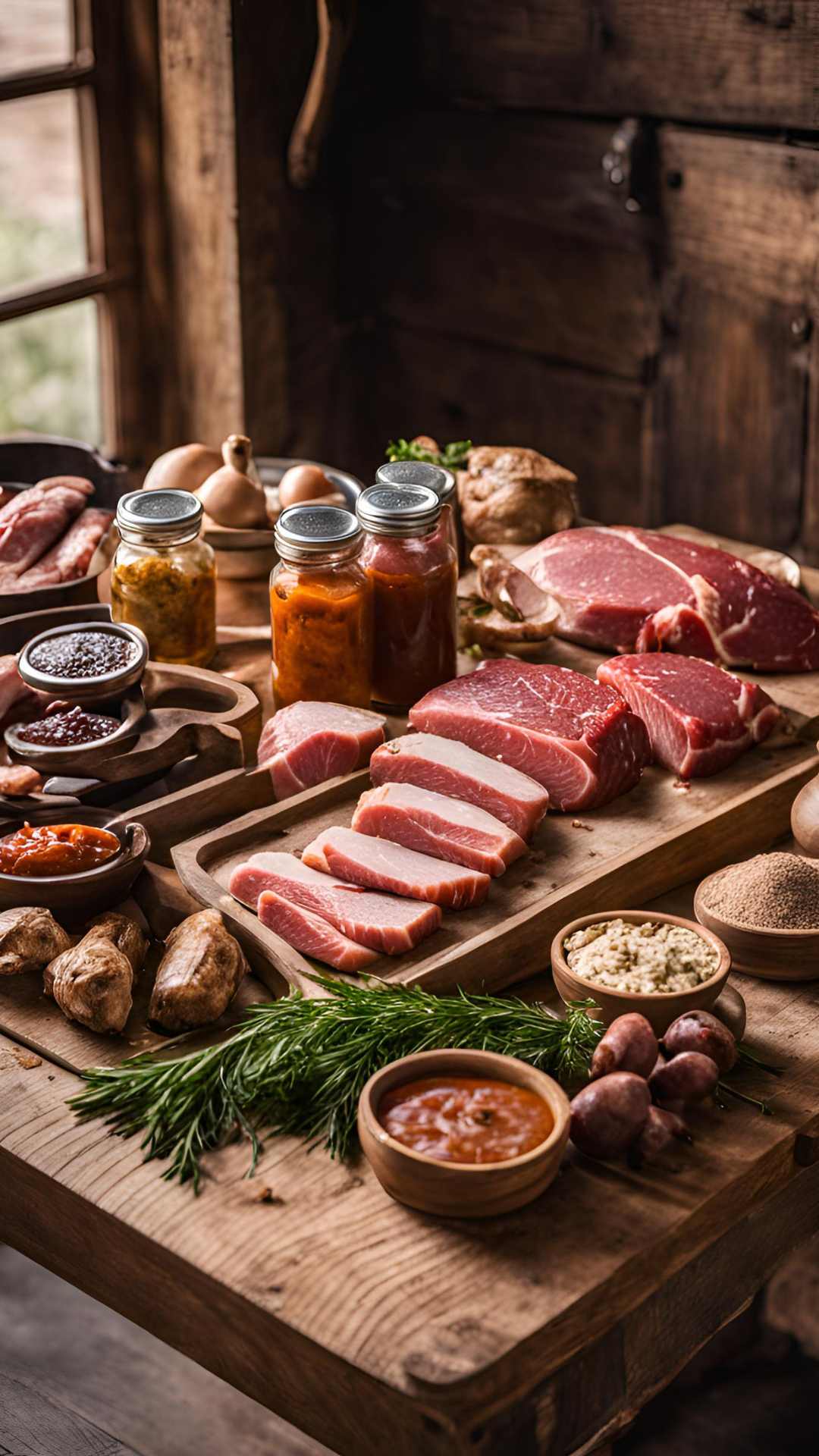- Key Takeaways:
- Marinating Times and Techniques: How Long is Long Enough?
- Understanding Marination: The Science Behind Flavor
- Common Myths About Marinating
- The Basic Mechanics of Marinating Meat
- The Master Marinade Blueprint
- Different Types of Marinades and Their Purposes
- How Long Should I Marinate? A Detailed Time Guide
- The Golden Marinating Rule: Dos and Don'ts
- Marinating Techniques: Best Practices
- What Cooking Methods Pair Best with Marinating?
- Marinating with Alcohol: Tips and Tricks
- Frequently Asked Questions
Unlocking the secrets of marination can elevate your cooking from ordinary to extraordinary.
This article delves into the science behind marination, dispelling common myths and revealing the fundamental mechanics that enhance flavor. You will learn about the ideal marinating times for various meats, vegetables, and seafood, as well as how to master different types of marinades.
This comprehensive guide will equip you with the knowledge to achieve maximum taste.
You will discover essential techniques, important dos and don’ts, and the best cooking methods to enhance your culinary creations. Explore this topic and embark on a journey toward creating mouthwatering meals.
Key Takeaways:
- Marinating is a science that enhances flavor, not just a way to tenderize meat.
- Contrary to popular belief, marinating for hours does not always result in better flavor. Follow a detailed time guide to achieve maximum results.
- To achieve the best flavor, use a combination of the right marinade, marinating technique, and cooking method. Experiment with different types of marinades and find what works best for you.
Marinating Times and Techniques: How Long is Long Enough?
Marinating is a culinary technique that plays a crucial role in enhancing the flavor and tenderness of various proteins, such as chicken, pork, and steak, by infusing them with differences in acidity and seasoning.
Understanding the appropriate marinating times and techniques is essential for home cooks aiming to achieve delicious and mouthwatering results. By utilizing different types of marinades—incorporating acidic components like vinegar or soy sauce along with aromatic herbs and spices—you can create a variety of flavors tailored to your taste preferences.
However, knowing the optimal marinating duration for each type of meat is vital, as it significantly influences the outcome, ensuring that your proteins are both flavorful and safe to consume.
Understanding Marination: The Science Behind Flavor
The science behind marination involves the interaction between proteins in meat and various acidic components found in marinades, such as vinegar, citrus juice, or yogurt. These acids not only tenderize the meat but also enhance the overall flavor of the dish.
As these acids penetrate the meat, they initiate a biochemical process that breaks down tough protein structures, resulting in a more fork-tender texture. This process is reciprocal; it allows flavorful components from the marinade to infuse into the meat, creating a delicious combination of tastes.
For an effective marinade, it is essential to achieve the right balance of acid, salt, and sugar. Salt helps draw moisture into the meat, while sugar caramelizes during cooking, adding a delightful depth of flavor. Together, these elements work synergistically to transform a simple cut of meat into a culinary masterpiece, packed with flavor and tenderness.
Common Myths About Marinating
There are several common myths about marinating that can mislead home cooks. For instance, the belief that longer marinating times always yield better flavor or that marinating can completely tenderize tough cuts of meat is prevalent.
In reality, marinating for excessive periods can lead to mushy textures, particularly with delicate proteins such as fish and shrimp, as the acids in many marinades can break down the protein structures too much. On the other hand, meats like chicken and beef can benefit significantly from marination, but only within a specific timeframe—typically a few hours to overnight.
The acidity level is crucial; while it can enhance flavor and promote tenderness, it’s essential to balance acidity with oil and spices to avoid overpowering the meat’s natural taste. Understanding these principles will enable you to maximize the benefits of marination while steering clear of common pitfalls.
The Basic Mechanics of Marinating Meat
Marinating meat involves a few essential principles that every home cook should grasp to enhance flavor and tenderness. The process typically begins with selecting the appropriate cut of meat, such as chicken, pork, or steak. You will then create a marinade that is well-balanced in acid, salt, and sweet ingredients to effectively penetrate the protein.
It is also important to consider the marinating time, as different types of meat require varying durations for optimal flavor infusion and tenderizing effects. The method of marination, whether in a bag, bowl, or vacuum-sealed container, can significantly influence how well the marinade adheres to the meat, contributing to a more flavorful outcome.
Once you have prepared the marinade, ensure that the meat is thoroughly coated, allowing every inch to be enveloped for consistent flavor. Depending on the cut and the cooking method, marinating times can range from 30 minutes to several hours or even overnight.
Grilling and baking are two prevalent cooking techniques that can notably affect the final result. High-heat grilling can caramelize the marinade flavors, while baking may yield a juicier texture if the meat is covered.
Regardless of the method you choose, following marinade guidelines is crucial to avoid overpowering the meat, ultimately leading to a balanced, mouthwatering dish.
The Master Marinade Blueprint
Creating the ultimate marinade requires a strategic approach that balances essential ingredients to achieve mouthwatering flavors and perfect tenderness in your protein, whether it be chicken, pork, or vegetables.
To master this culinary art, you should incorporate a mix of acids, such as vinegar or citrus juice, which help break down proteins while adding brightness to the dish. Oils, like olive oil or sesame oil, coat the ingredients, promoting even cooking and enhancing richness.

Seasonings—including herbs and spices—are crucial for imparting depth and aroma, while sweeteners like honey or brown sugar contribute to appealing caramelization during grilling or roasting.
For an irresistible chicken marinade, consider mixing lemon juice, olive oil, garlic, rosemary, and a touch of honey. Alternatively, a soy sauce-based marinade with ginger, sesame oil, and scallions works wonders with pork, creating a delicious Asian-inspired meal.
Different Types of Marinades and Their Purposes
There are various types of marinades, each serving a distinct purpose in enhancing the flavor and texture of meats, vegetables, and seafood, depending on the desired outcome of your dish.
By understanding the main categories of marinades—acid-based, oil-based, and dairy-based—you can select the right one for your ingredients. Acid-based marinades, often including ingredients like vinegar or citrus juice, are effective at tenderizing proteins while adding a zesty kick, making them ideal for meats such as chicken and steak.
Oil-based marinades, featuring ingredients like olive oil and various herbs, help lock in moisture and create a vibrant, rich flavor profile, perfect for grilling shrimp or vegetables. Conversely, dairy-based marinades, typically made with yogurt or buttermilk, not only add creaminess but also tenderize proteins effectively, making them excellent for marinating chicken or even tofu for a vegetarian option.
For instance, a classic chimichurri marinade can elevate flank steak, while a garlic and herb oil marinade brings shrimp to life. Each marinade presents a unique opportunity to explore diverse flavors and textures within your dishes.
How Long Should I Marinate? A Detailed Time Guide
Understanding the appropriate marination times for different types of proteins—such as various meats, seafood, and vegetables—is essential for achieving optimal flavor and texture. Learn more about marinating times and techniques here.
This practice also minimizes the risk of overexposure and prevents the growth of unwanted bacteria that can result from prolonged marination.
Marinating Times for Different Types of Meat
Different types of meat require specific marinating times to achieve optimal flavor and texture, ensuring that proteins such as chicken, pork, and steak are effectively infused with the marinade.
For instance, chicken benefits from a marinating time of 30 minutes to 2 hours, as its tender texture allows it to absorb flavors quickly. In contrast, pork is best marinated for at least 1 to 4 hours, depending on the cut, with thicker portions needing the longer end to fully soak in the seasoning.
Regarding beef, particularly tougher cuts like brisket, marinating for 4 to 24 hours can enhance tenderness and deepen flavor. Lamb, on the other hand, typically requires 1 to 3 hours, as its robust profile can handle strong marinades without becoming excessively saturated.
Understanding these guidelines can significantly elevate your culinary creations.
Vegetables and Seafood: How Long to Marinate
The marinating times for vegetables and seafood differ significantly, as they tend to absorb flavors more rapidly than denser meats. It is essential for you to know the appropriate marinating duration for items such as shrimp, tofu, and fresh vegetables.
To achieve the ideal balance, delicate seafood like shrimp or scallops should be marinated for only 15 to 30 minutes, while firmer vegetables like zucchini or bell peppers can benefit from a slightly longer soak of up to an hour. This difference is largely due to their cellular structure, which allows marinades, particularly those containing acidic components such as citrus or vinegar, to penetrate quickly.
It is crucial to avoid overpowering the natural taste of these ingredients. Instead, focus on achieving a harmonious flavor enhancement by using lighter seasonings and essential oils, ensuring that the distinct characteristics of your ingredients remain prominent.
The Golden Marinating Rule: Dos and Don’ts
When marinating, adhering to a specific set of dos and don’ts can significantly enhance your culinary outcomes while ensuring that both flavor and food safety are prioritized.
Recognizing the importance of acidity is essential, as it tenderizes meat and infuses flavors. For example, incorporating vinegar or citrus juice can elevate your dish; however, be mindful not to over-marinate, as this may result in a mushy texture.
It is equally important to avoid metal containers, which can react with acidic ingredients and compromise both taste and safety. Instead, opt for glass or plastic containers. Additionally, never reuse marinades that have come into contact with raw meat, as this practice can lead to foodborne illness.
A prudent approach is to reserve a portion of the marinade for use as a sauce afterward, which enhances flavor while maintaining food safety.
Marinating Techniques: Best Practices
Implementing effective marinating techniques is essential for ensuring that your proteins and vegetables absorb flavor optimally and achieve the desired tenderness.
Utilizing various methods for marination can significantly enhance your culinary outcomes. Options such as zip-top bags allow for easy coating and massaging of the marinade into the ingredients, while vacuum sealing draws flavors deeper into the food, ensuring more intense absorption. Shallow dishes provide a practical way to submerge ingredients in the marinade, allowing for better exposure to spices and acids.
To achieve consistent results, it is important to consider factors such as marinating times, proportions of the marinade, and the balance between acidity and oil. Additionally, periodic flipping or agitation during the marination process can enhance flavor penetration, maximizing your culinary endeavors.
What Cooking Methods Pair Best with Marinating?
Different cooking methods, such as grilling, roasting, or sautéing, can significantly benefit from the use of marinated ingredients, enhancing flavor and tenderness in various dishes.
For example, when you marinate chicken in a mixture of yogurt and spices, grilling allows for a beautiful char while keeping the meat juicy and full of flavor. Similarly, marinating beef in a blend of soy sauce and garlic can make it incredibly tender and infused with rich tastes, showcasing its potential in a robust stir-fry. Learn more about Marinating Times and Techniques: How Long is Long Enough?
When roasting marinated vegetables, the natural sugars caramelize beautifully while allowing the marinade to penetrate, resulting in a vibrant and flavorful side dish. The diverse range of techniques not only complements the marinated items but also brings out unique textures and aromas, transforming simple ingredients into culinary masterpieces.
Marinating with Alcohol: Tips and Tricks
Incorporating alcohol into your marinades can elevate flavors and create unique taste profiles, but it requires specific techniques and considerations to achieve optimal results.
Different types of alcohol—such as wine, beer, and spirits—can significantly influence the marinating process, imparting distinct flavors and aromas to your dish. For instance, red wine complements beef with its rich tannins, while white wine enhances poultry with its crisp acidity. Light beers can add a subtle sweetness to pork, and spirits like whiskey can introduce bold, smoky flavors.
When using alcohol in marinades, it’s essential to balance the quantities; using too much can overpower the dish or toughen protein fibers. To achieve harmony, consider starting with a small amount and gradually adjusting. Always remember to marinate within recommended time frames to avoid potential pitfalls, such as overly bitter or boozy results.
Frequently Asked Questions
How long should I marinate my meat for optimal flavor?
The marinating time varies depending on the type of meat you are using. Generally, poultry and seafood require 30 minutes to 2 hours of marinating time, while red meat can benefit from 2-24 hours of marinating.
Can I marinate my meat for too long?
Yes, it is possible to over-marinate your meat. If you leave it in the marinade for too long, the meat will become mushy and lose its texture. It is best to follow the recommended marinating times for the type of meat you are using.
What is the purpose of marinating meat?
Marinating helps to infuse flavors into the meat, making it more tender and flavorful. It also helps to tenderize tougher cuts of meat by breaking down the fibers.
Can I reuse a marinade?
No, it is not recommended to reuse a marinade. The marinade contains raw meat juices, which can potentially contaminate your food. It is best to discard the marinade after use.
Do I need to marinate meat that I am grilling or roasting?
Marinating is not necessary for grilling or roasting meat, but it can enhance the flavors and tenderness of the meat. You can also brush on the marinade while grilling or roasting for added flavor.
Are there any tips for marinating meat?
Yes, make sure to marinate the meat in a non-reactive container, such as glass or plastic, and always refrigerate it during the marinating process. Also, do not use too much acid in your marinade, as it can make the meat tough.



















































